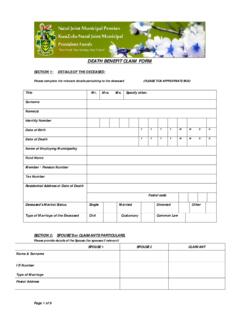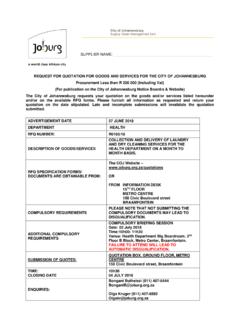Transcription of THE HIGH COURT OF SOUTH AFRICA (WESTERN …
1 THE HIGH COURT OF SOUTH AFRICA ( western cape division , cape TOWN) Case No: 8231/2014 In the matter between: FUNEKA KHAN APPLICANT And THE MINISTER OF HOME AFFAIRS FIRST RESPONDENT DIRECTOR-GENERAL: DEPARTMENT OF HOME AFFAIRS: western cape MR JACKSON: IMMIGRATION OFFICER, cape TOWN INTERNATIONAL AIRPORT SECOND RESPONDENT THIRD RESPONDENT Coram: ROGERS J Heard: 19 JUNE 2014 Delivered: 27 JUNE 2014 _____ JUDGMENT _____ 2 ROGERS J: Introduction [1] The applicant alleges that she is the wife of Murad Khan ( Khan ), a Pakistani national. On Friday 9 May 2014 she launched an urgent application for the issue of a rule nisi calling on the respondents (the Minister and various officials in the Department of Home Affairs) to show cause why they should not be interdicted from causing Khan s deportation and why they should not be directed to release him forthwith, with the rule nisi to operate as an interim interdict.
2 At about noon Yekiso J granted the order. [2] On the evening of the same day, 9 May 2014, the respondents sought to anticipate the return day. The matter came before Schippers J. By agreement the matter was postponed for hearing at 14h00 on Monday 12 May 2014. The rule nisi was extended on the basis that Khan would be released from the Department s custody subject to certain specified conditions. Among these was that he was to take up accommodation at a specified hotel at cape Town International Airport, that he was to report three times daily to the office of the SOUTH African Police ( SAPS ) at the airport, that he was to surrender his passport until the matter was finalised, and that he would not leave the premises of the airport without informing a named official. [3] The duty judge was not able to hear the matter on 12 May 2014.
3 The case rolled over day by day until Friday 16 May 2014 when Bozalek J postponed it for hearing on 5 June 2014 with a timetable for the filing of further papers, and extended the rule nisi. By this stage Khan had, with the agreement of the respondents, been allowed to leave the airport for the Eastern cape , where he was to report to SAPS at Mthatha each Wednesday until finalisation of the case. [4] The respondents filed their answering papers on 12 May 2014. The applicant filed a replying affidavit dated 17 May 2014. On 24 May 2014 the respondents delivered supplementary answering papers. When the matter came before me on 6 3 June 2014 (having been crowded out the previous day), there was no supplementary replying affidavit in the file. There was a duplicate of the initial replying affidavit at the place in the index where one might have expected to find supplementary replying papers.
4 After some initial confusion, Mr Uijs SC, who appeared for the applicant, informed me that a supplementary replying affidavit existed but that the initial replying affidavit had mistakenly been filed instead of the supplementary replying affidavit. Since the respondents, represented by Messrs G Papier and C Simons, had not received the supplementary replying papers, the matter stood down. I was later informed in chambers that the respondents insisted on a substantive application for condonation. By agreement I made an order postponing the case to 19 June 2014 with a timetable for the filing of papers in the condonation application. [5] In terms of my order of 6 June 2014, the applicant was required to file her condonation application by 9 June 2014. She delivered it on 17 June 2014.
5 The respondents filed an affidavit in opposition on 18 June 2014. The matter served before me on 19 June 2014. [6] The Immigration Act and the regulations promulgated thereunder were amended with effect from 26 May 2014. The present matter falls to be determined with reference to the law as it stood prior to these amendments. Condonation [7] The respondents were entitled to a postponement on 6 June 2014, given that they only received the supplementary replying affidavit (which ran to 34 pages) on that day. I consider, though, that it was unnecessarily formalistic for them to insist on a substantive condonation application. The postponement afforded them sufficient opportunity to consider the supplementary replying affidavit and adjust their arguments. [8] Nevertheless, since the parties agreed on a procedure for a substantive application for condonation, the applicant should have observed the time limits laid down in my order of 5 June 2014.
6 The applicant s attorney, Ms N ckler, who made 4 the affidavit in support of condonation, explained the error in the filing of the supplementary replying affidavit without offering any explanation for the delay in delivering the condonation application. [9] Despite this non-compliance, it would not be just to refuse to receive the supplementary replying affidavit. Despite the respondents counsel s written submissions to the contrary (not pressed in oral argument), it is clear that what occurred here was an honest mistake, nothing more sinister. The applicant s attorney was undoubtedly at fault in effecting service and indexing the COURT papers without properly checking that what she was serving and filing was the supplementary replying affidavit rather than a repeat of the initial replying affidavit.
7 In the event, though, this error has led to no further delay in the hearing of the matter, which is the only prejudice which the respondents might otherwise suffer. [10] I shall thus grant the condonation application but direct the applicant to pay the wasted costs of the postponement of 6 June 2014. The parties shall bear their own costs in respect of the condonation application. I shall deal later with the question whether Khan himself should be responsible for any costs. Approach to disputes of fact [11] I was not addressed on the approach to disputes of fact. In terms of the notice of motion, the applicant on the extended return day has sought final relief, namely a final interdict against deportation and a final order of unreserved release. The Plascon-Evans rule thus applies to factual disputes insofar as that relief is concerned.
8 [12] During the course of argument Mr Uijs asked that, if I was not prepared to grant relief in the form prayed because of the existence of an internal remedy (as to which, see below), I should grant an interdict against deportation pending the outcome of the internal remedy. That would probably amount to an interim interdict, because my decision would then not finally determine the rights of the parties (see LAWSA 2nd Ed Vol 11 Interdicts para 401), even though the final determination would be made not by the COURT but by the Minister (to whom the internal review 5 lies), subject of course to any judicial review of the Minister s Mr Uijs fall-back position would in essence involve an extension of the existing interim interdict, except that it would now operate pending the Minister s decision rather than pending the COURT s final decision.
9 In respect of such interim relief, the Plascon-Evans rule would not apply. The test would be whether the applicant has made out a prima facie case, though open to some doubt (LAWSA op cit para 404). The other requirements for an interim interdict would need to be met (irreparable harm, balance of convenience and the absence of another adequate remedy). The facts [13] Khan, as I have said, is a Pakistani national. He has a Pakistani passport valid until 17 October 2015. At a time prior to 2006 he married one Safia in Pakistan and the marriage subsists. In terms of the laws of Pakistan, Khan was entitled, subject to compliance with certain conditions, to contract further marriages. There are two children in Pakistan from his marriage with Safia. [14] It appears that Khan first came to SOUTH AFRICA on a temporary asylum seeker s permit dated 25 November 2005 issued in terms of s 22 of the Refugees Act 130 of 1998.
10 [15] The applicant, who is a lady from the Eastern cape , and Khan allege that during 2006 they got married in SOUTH AFRICA , first by Xhosa tradition (including the payment of lobola), then (after the applicant had converted to the Muslim faith) by Muslim rites and finally at a civil ceremony on 4 May 2006 at the Department of Home Affairs in Port Elizabeth. They have a marriage certificate dated 4 May 2006 in usual form purportedly issued by the Department of Home Affairs. There are no children from this marriage. They say they have tried to start their own family but that the applicant has suffered four miscarriages. 1 See Fedsure Life Assurance Co Ltd v Worldwide AFRICA Investment Holdings (Pty) Ltd & Others 2003 (3) SA 268 (W) where an interim interdict was granted pending a final determination by an arbitrator.














